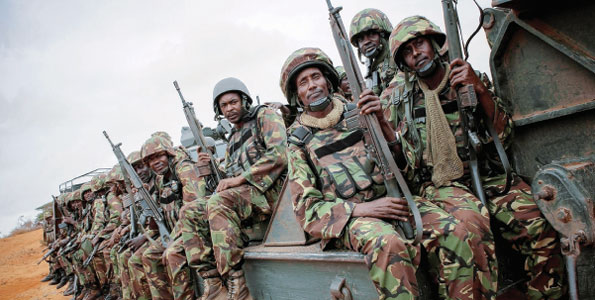
In Summary:
- A new poll by Ipsos shows that only 38 per cent believe the war in Somalia will lead to the military defeat of the terrorist group.
- Even though 57 per cent of Kenyans still support the deployment, 49 per cent say KDF, whose mission is to pacify the country and keep Al Shabaab militants from the Kenyan border, will not unify the war-torn country.
- Opposition leaders have demanded an exit strategy — but the government says the KDF presence in Somalia is helping destabilise Al Shabaab and prevent the country from imploding.
By TREVOR ANALO | The EastAfrican | September 7 2015 | While Kenyans unanimously agree that Al Shabaab remains a threat to the country’s security, they do not agree on the continued deployment of the Kenya Defence Forces in Somalia.
A new poll by Ipsos shows that only 38 per cent believe the war in Somalia will lead to the military defeat of the terrorist group.
Even though 57 per cent of Kenyans still support the deployment, 49 per cent say KDF, whose mission is to pacify the country and keep Al Shabaab militants from the Kenyan border, will not unify the war-torn country.
In late 2011, the Kenyan military received overwhelming public support when it crossed into Somalia in hot pursuit of Al Shabaab militants following a wave of small scale attacks in the country’s north and the Coastal region.
However, as a result of the incursion, Kenya has suffered many retaliatory attacks, leading to a drop in public support for the mission and questions on whether the operation is failing.
The most brutal attack happened in April, when a group of militants, led by a former law student of the University of Nairobi, killed 148 people, the majority of them students at the Garissa University College.
“In terms of general support for the continued presence of the KDF in Somalia, the country appears almost evenly split, with just a modest majority favouring this policy,” the report by Ipsos says.
Opposition leaders have demanded an exit strategy — but the government says the KDF presence in Somalia is helping destabilise Al Shabaab and prevent the country from imploding.
Kenya has about 5,000 troops in Somalia, now “rehatted” under the African Union Mission in Somalia (Amisom).
Should Kenya bow to pressure to withdraw KDF from Somalia, this would complicate the AU’s peace efforts in the country as it would be hard to find another country ready to provide 5,000 troops.
Support for the mission also varies according to political affiliation, with 70 per cent of President Uhuru Kenyatta’s Jubilee coalition supporters backing the operation against Cord’s 39 per cent.
Terrorism threat
While there has been relative calm since the April attack, terrorism still remains a big threat to many Kenyans. An overwhelming majority of 76 per cent — across the political divide — consider terrorism a big threat.
On measures to counter this threat, Cord supporters prefer withdrawing troops and cutting down on corruption. Some, however, call for a surge in the number of troops.
Jubilee supporters, on their part, prefer maintaining the troops in Somalia, and even increasing the numbers. They also say more intelligence would help neutralise the threat.
Kenya’s security agencies have traded barbs over whose responsibility it is to act on intelligence supplied by the National Intelligence Agency (NIS).
The NIS has complained on several occasions that it supplied the police with intelligence on an impending attack that they failed to act on.
.
.
__________________________
_____________________________________________________________________________________
Xafiiska Wararka Qaranimo Online | Mogadishu, Somalia
_____________________________________________________________________________________Advertisement
_____________________________________________________________________________________ _____________________________________________________________________________________
_____________________________________________________________________________________
 _____________________________________________________________________________________
_____________________________________________________________________________________






